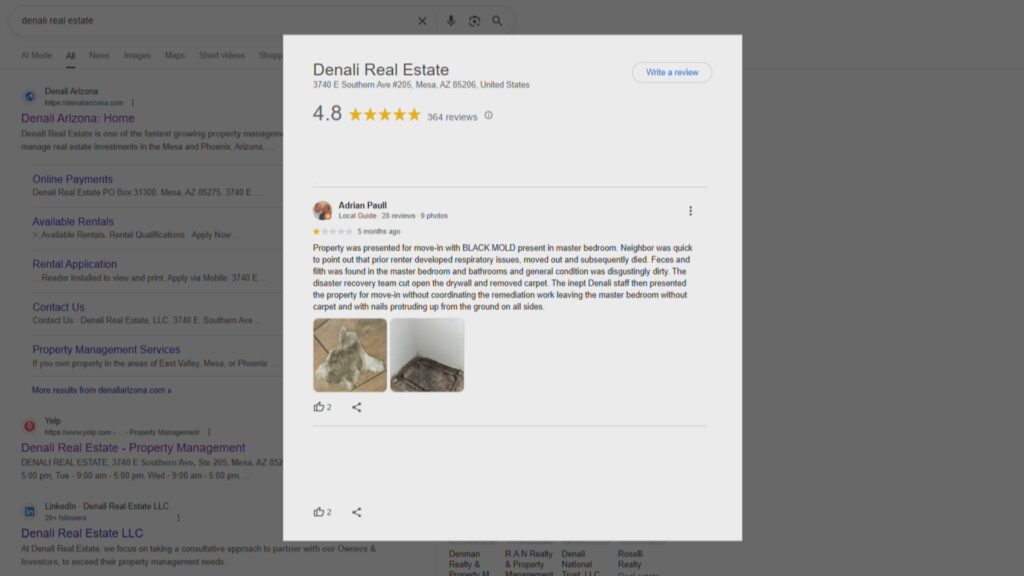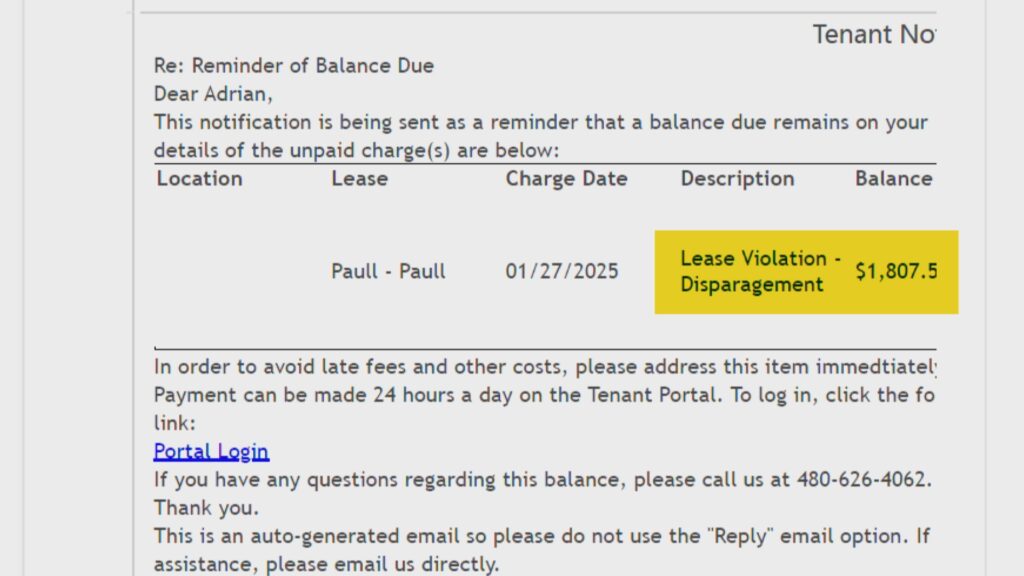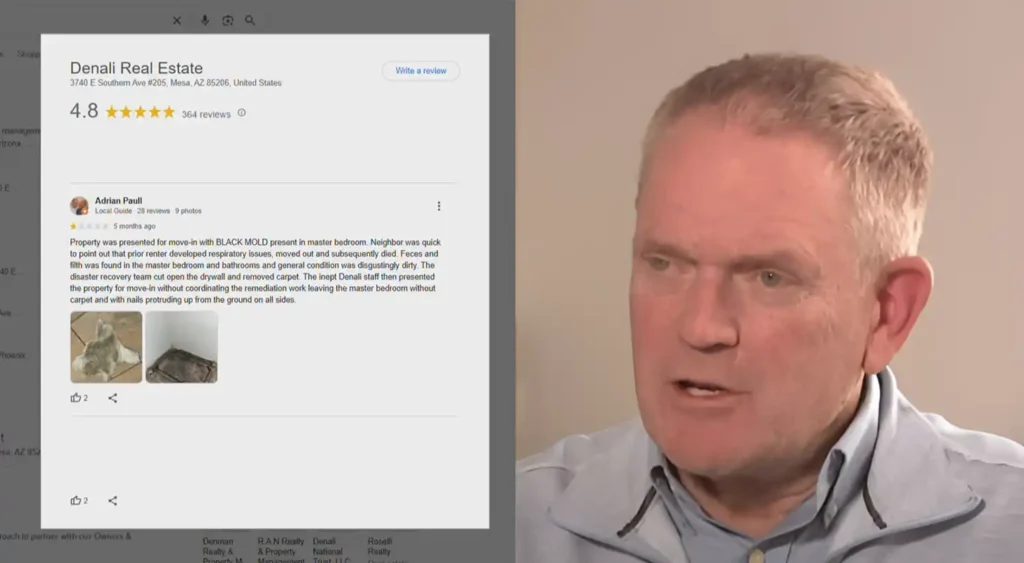I thought I’d seen every landlord hustle. Then Denali Real Estate tried to bill a tenant two grand per bad review. That’s not a typo. Two thousand dollars. Per review. Because nothing screams “quality property management” like charging people for telling the truth.
What follows is a blow‑by‑blow of the scam, the black mold, the illegal contract clause, and the media firestorm that followed. If you own property, take notes on what not to do. If you rent, grab popcorn and your lease. You might have an illegal clause hiding in there, too.
The Setup: A Condo With Extras (Mold, Holes, Carpet Tacks)
Adrian Paull and his wife sold their Scottsdale home and needed a place while house‑hunting. They signed a lease at a condo near 96th Street and Via Linda, moving in a month early so they’d have “breathing room.” That room turned out to be full of spores.
On the pre‑move‑in visit they found a mystery cabinet in the master bedroom. They moved it, saw a giant patch of black mold, and noped out of there. Denali said they’d fix it. Spoiler: they didn’t. When Paull returned on moving day the unit still had mold, missing carpet, holes in the wall, and carpet tacks poking up like caltrops. Exactly what you want when you’re hauling boxes in bare feet.
Paull messaged Denali. Denali ghosted him. So he wrote two short reviews—one on Yelp, one on Google—detailing the mess. He figured public pressure might force action.

The Clause: Speech Isn’t Free, It’s $2,000 a Pop
Denali’s lease is twenty‑one pages of “gotcha.” Buried in the middle is a “non‑disparagement” clause. It bans “negative online reviews, ratings of 3 stars or less, and negative posts on all social media and review platforms.” Each violation costs the tenant $2,000.
Paull posted two reviews. Denali grabbed $4,000 out of the tenant portal, flipping his $2,200 rent credit into an $1,800 debt overnight. Talk about landlord alchemy: turn mold into money.

The Law: Consumer Review Fairness Act
Here’s the part Denali skipped. Since 2017 the Consumer Review Fairness Act (CRFA) has made it illegal for any business to penalize consumers for honest reviews. The Federal Trade Commission loves nothing more than crushing companies that try. Non‑disparagement clauses in consumer contracts are void on arrival, like milk left in the Arizona sun.
In short: the clause never had legal weight. It was an intimidation tool. And for years it probably worked, scaring tenants into silence so the Google stars stayed shiny.
The Blowback: Internet 1, Slumlord 0
Paull didn’t quietly pay. He sent screenshots to 12 News. The station aired the story on July 3. Social media lit up. Reddit threads sprouted like, well, mold. YouTube clips hit six‑figure views in days. Even Yahoo picked up the headline.
Public shaming does wonders. Less than 24 hours after the story ran, Denali issued a statement:
They take feedback seriously.
They’re deeply involved in the community.
They’ve sent the lease to two law firms.
They will remove the clause “immediately.”
Translation: “We got caught, the pitchforks are out, please stop tagging us.”
Denali also hurled a classic landlord counter‑accusation: Paull supposedly denied repair crews access and wanted publicity. Because nothing says “I love attention” like having your bedroom gutted and smeared with animal feces after a storm rips the wall open.
Meanwhile Paull filed complaints with the Better Business Bureau, the Arizona Attorney General, and the FTC. He’s also educating other renters about the CRFA. Denali hasn’t confirmed whether the $4,000 charge will be erased. Cute.
Meet the Wizard: Michael Van Vleck
Every circus needs a ringmaster. Michael Van Vleck is Denali’s owner and designated broker. Zillow calls him “mikev11.” Eighteen years in real estate. Nine service areas. Zero user reviews—funny how that works when you charge $2,000 per bad one.
Van Vleck could have paid a mold remediation crew and fixed some drywall. Instead he paid an attorney to write a gag clause, then paid PR flacks to write excuses when it blew up. Priorities: exposed.
Why Non‑Disparagement Clauses Persist
- Fear works. Most tenants don’t have time to fight or money for lawyers.
- Reputation is money. A clean review page means higher rents.
- Few people know the law. CRFA violations aren’t exactly water‑cooler talk.
- Enforcement is slow. The FTC moves, but usually after someone complains.
Put those together and slumlords think they can bluff forever. Denali just learned otherwise.
How to Spot and Kill a Gag Clause
- Scan for “disparagement,” “reviews,” or any fee tied to speech.
- Cross it out before signing. Initial the margin. Keep a copy.
- Email the landlord the CRFA link. Polite, but firm.
- Walk away if they refuse. If they lie on paper, imagine maintenance.
Already under lease? Post your review. If they threaten you, reply with the CRFA. If they bill you, file complaints. Small‑claims court loves slam‑dunk cases.
Denali’s PR Spin vs. Reality
Spin: “We comply with all laws.”
Reality: You literally wrote an illegal clause.
Spin: “We value feedback.”
Reality: You priced feedback at $2,000.
Spin: “Tenant denied access.”
Reality: The place still has mold and ripped‑open walls.
Spin: “We’re a small local company.”
Reality: You still have to obey federal law, small fry.
The Bigger Picture: Reviews Keep Us Safe
Online reviews are the modern Better Business Bureau. They expose health hazards, scams, and companies that treat customers like ATM machines. When a landlord silences tenants, future renters walk into the same trap unaware. That’s why the CRFA exists. Honest speech is infrastructure.
Call to Action
If you rent, read your lease tonight. If you see a speech penalty, highlight it like it’s radioactive—because it is. Tell your friends. Post reviews when things go wrong. Landlords who spend more on legal duct tape than actual duct tape deserve every negative star they earn.
And if you’re a property manager thinking a gag clause looks tempting, remember Denali. They wanted silence. They got a megaphone instead.

